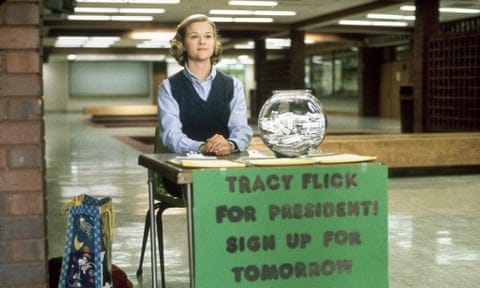Ferris Bueller Grows Up
John Hughes wrote, produced, and directed some of the most successful films of the 1980s. They were mostly about high school students. Critics accused him of pandering to the Reagan Era ethics and morals and trying to push them on teenagers. As a teenager in the 80s, it occurred to me that after more than a decade of “Happy Days” and “Lavern and Shirley,” that job had already been accomplished. Everybody in America wanted to go back to the 1950s, except maybe a few soreheads like Ruby Bridges.
My dad liked for me to keep my feet on the ground, even if it meant knocking me out of the air first. Considering what happened with my brother’s schizophrenia, I’m pretty sure he thought he was saving me. Maybe he was. Daddy explained that the American Economic Miracle of the 1950s was largely due to the fact that most of our competition had been bombed back to the Stone Age during the war. By the 1970s, the Germans and the Japanese were taking industry away from America. Our advantage didn’t last long. He also explained that, sometimes, what seemed like the truth to upper-middle-class Southern white kids wasn’t always the truth, and he introduced me to Ivan Allen, who had been the Mayor of Atlanta and had some different ideas about the reality of the Southern economy.
Hughes defended his movies, saying there should be room for movies about upper-middle-class white kids from Suburban Chicago. Most of my friends agreed. I used to go parking with a girl who thought “Ferris Bueller's Day Off” was the greatest movie ever. I hated it. I hated them all. “Sixteen Candles,” “The Breakfast Club,” all of them. I hated them because they weren’t about us. As an upper-middle-class white kid, I thought his movies were some sort of fantasy we had about ourselves, not us as we were, and as much as I love Mia Sara, I just couldn’t go there with Ferris.
There are a number of interesting fan theories about Ferris Bueller. One is that he doesn’t exist. Ferris is Cameron’s fantasy of himself, and the entire movie is Cameron’s dream about the life he’d like to have. Another theory is that Cameron grows up to be Tyler Durden from “Fight Club,” and Cameron is the Narrator, played by Edward Norton.
My favorite fan theory about Ferris Bueller is that he grows up to be Jim McAllister in the 1999 film “Election,” and he returns to high school, only this time as a teacher, and things don’t go as well as they did for Ferris in high school.
“Election” is co-written and directed by Alexander Payne, who went on to write and direct “Sideways.” It’s based on the 1998 novel by Tom Perrotta. In 2022, he wrote a sequel titled “Tracy Flick” Can’t Win. Although nobody ever admits to it, Tracy Flick sounds an awful lot like Sammy Glick from the novel, “See Sammy Run,” which covers some of the same issues.
Tracy Flick is an overachieving high school junior who, even though she comes from a broken home and a humble financial status, works and works until she gets everything she wants. She also has an affair with her geometry teacher that ruins his life, but not hers. Tracy runs for student body president unopposed until Matthew Broderick’s character, Mr. McCallister, the civics teacher, decides that somebody has to run against her since he blames her for what happened to his best friend, the geometry teacher.
Matthew Broderick was an established star by this point, so the film wasn’t much of a risk for him. He was also pretty tired of playing nice guys who always win. Reese Witherspoon was risking everything, though. With only a few roles under her belt, playing such a complex character, one with such adult themes that everybody ends up hating, was a part with an awful lot of meat on the bone, but had she faltered, it could have ended her career.
By 1999, the Reagan era was long since over, and the Clinton era was coming to an end, and people were struggling to make sense of it all. That’s where “Election” comes in.
One of the things I love about this film is that the plot is so very tight. There’s not a wasted moment, and everything ties into everything else. The film makes the point that, in America, everybody who invests themselves in the political process either becomes a Tracy Flick or a Jim McCallister, and they’re both assholes. Who you want to be is Paul Metzler or his lesbian sister, Tammy. They’re the only people in the movie who come away happy.
“Election” is available on most streaming services. It’s been twenty-six years since it came out and forty years since Ferris Beuler came out. Considering how irrational most of today’s political news is, “Election” provides a pretty effective change of perspective.


